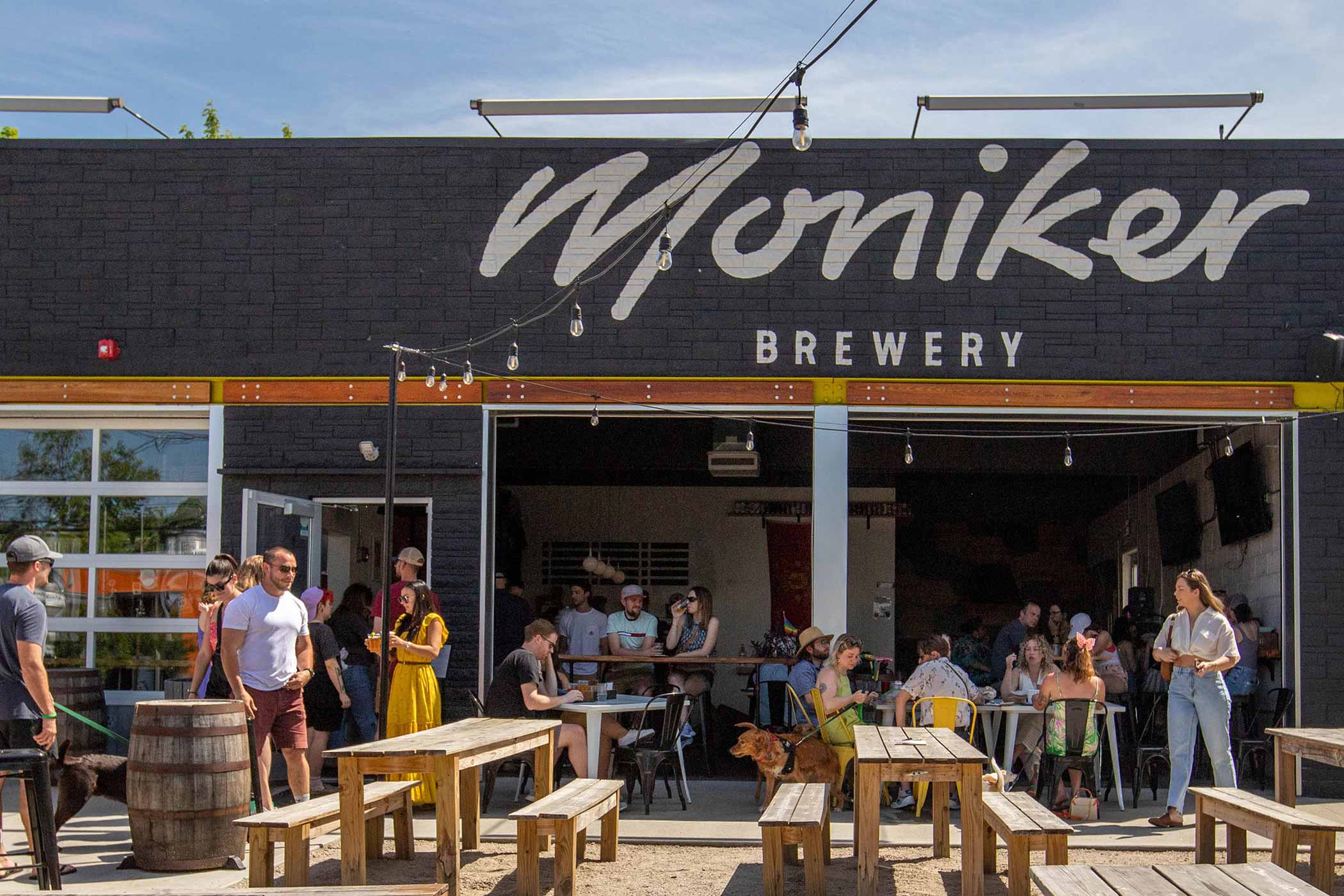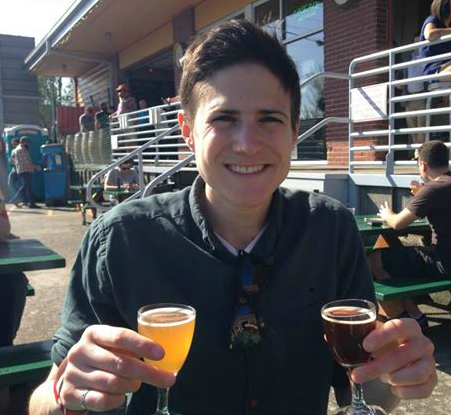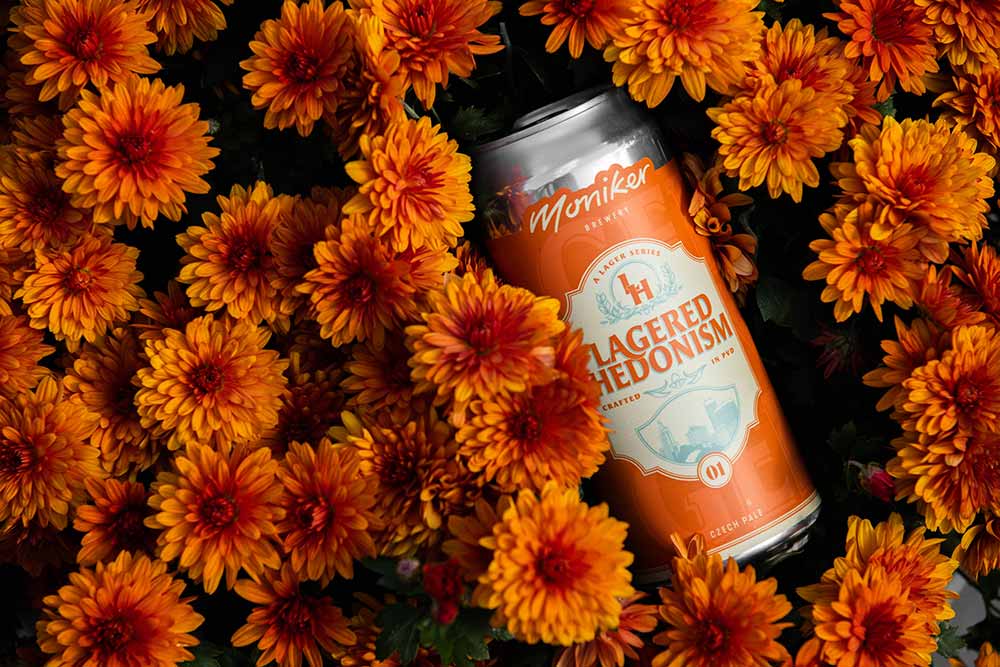Shop
Moniker: In America’s Smallest State, You’ll Find Its Mightiest Brewery
Small but mighty.
Like This, Read That
The Wizarding World of Wondrous Brewing
Holy Water
Moniker: Remember that name.
That was our advice when we named this Providence-based brewery to our list of the “17 Best Breweries to Watch in 2025.”
Have you heard of them? Well, listen to this, because here’s what impressed us so much at the mighty brewery from the smallest state in the country: Not only did we enjoy all the beers they so kindly sent us, but one of the styles that impressed us most is rarely seen in the States—Dortmunder.
We loved this beer so much that we named it to our ranking of ““The Top Fifteen Beers We Drank in March 2024.”
The beer speaks for itself from a brewery nailing everything from esoteric styles (along with that Dortmunder, the brewery used to make a flagship cream ale) to lagers the likes of German pilsners, Mexican lagers, Czech-style pilsners, and even hoppy ales.
We mentioned Moniker a lot last year, and we expect to hear that name leave our lips many times in the future.
The word is out. Now it’s time for you to go to the place where there’s a beer for everybody. And everybody knows your name.
Home(brewing) Improvement?
Moniker Co-Founder Brian Benedict started homebrewing with the help of a friendly Philly neighbor.
In a sort of Home Improvement moment, “I started brewing in our backyard over the fence over a couple of beers,” recalls Benedict, who was in grad school and working for a big company that he thought “didn’t feel right.”
Eventually, he had to decide to either pursue a career in IT or “jump headfirst while I was still young into craft beer.”
He spent time selling beer for a distributor in Rhode Island and working on the supply side with Beer’d Brewing in Connecticut.
In 2019, Benedict, along with friend and Moniker Head Brewer Ben Estes, jumped at the opportunity to buy a vacant building in the West End area of Providence.
He says, “We fell in love with the neighborhood.”
Where Everyone Knows Your Moniker
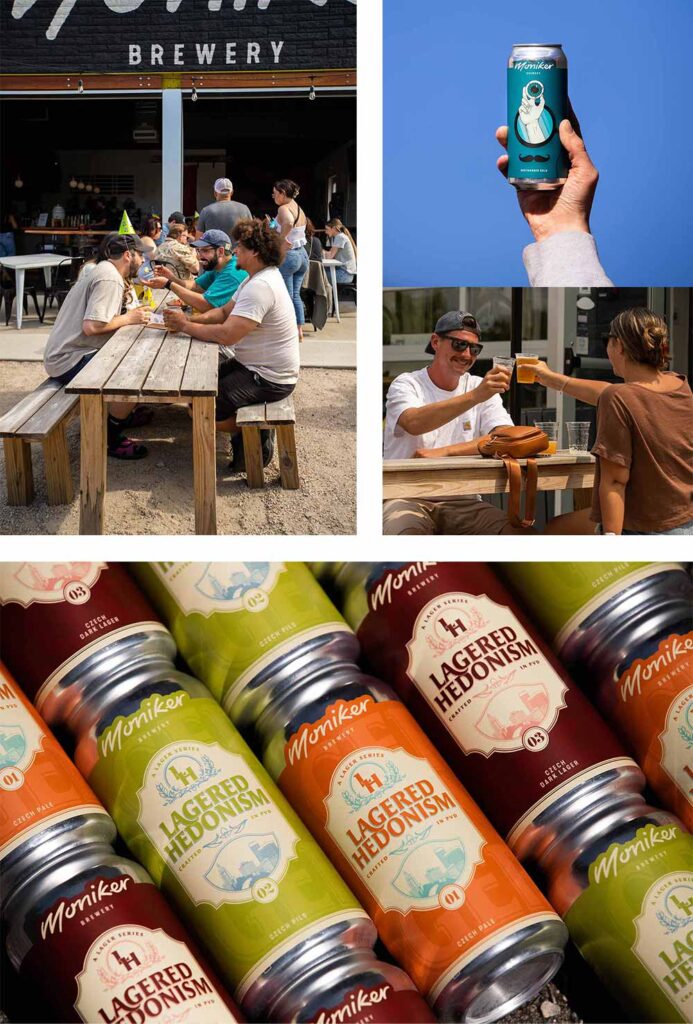
Photography courtesy of Emily Frye | Moniker Brewery
The goal, says Benedict, is pretty simple. “We want to be the cornerstone of the community.”
Despite being the third-largest city in New England, Providence often gets overlooked in favor of more well-visited places like Boston or Portland, ME.
But Benedict argues Providence is a “spectacular city” with a world-class culinary and hospitality industry. “We wanted to bring craft beer to that scene,” he says.
Amazingly, when Moniker opened in 2021, Benedict says only one other production brewery existed in Providence.
While places like Portland had forty-plus breweries, Providence had barely any.
“There was a giant hole,” explains Benedict.
Moniker filled it.
“We’re all about just being a safe space for everybody,” explains Moniker’s Marketing and Events Coordinator Emily Frye, who worked in distilleries in Louisville, KY, before moving to Providence. “We have every walk of life come through here.”
Benedict thinks it’s really that straightforward.
You obviously have to make good beer, but if you back that up with good service and culture, it doesn’t matter how much money you spend on marketing or design, “people are going to come,” he says. “It’s about the simple things: Have a good time, treat people right.”
That’s Moniker.
“It’s just this constant reminder to us that it’s not about the brand; it’s about the people,” Benedict says humbly.
It just so happens the beer is making a name for itself, too.
A Beer By Any Other Name
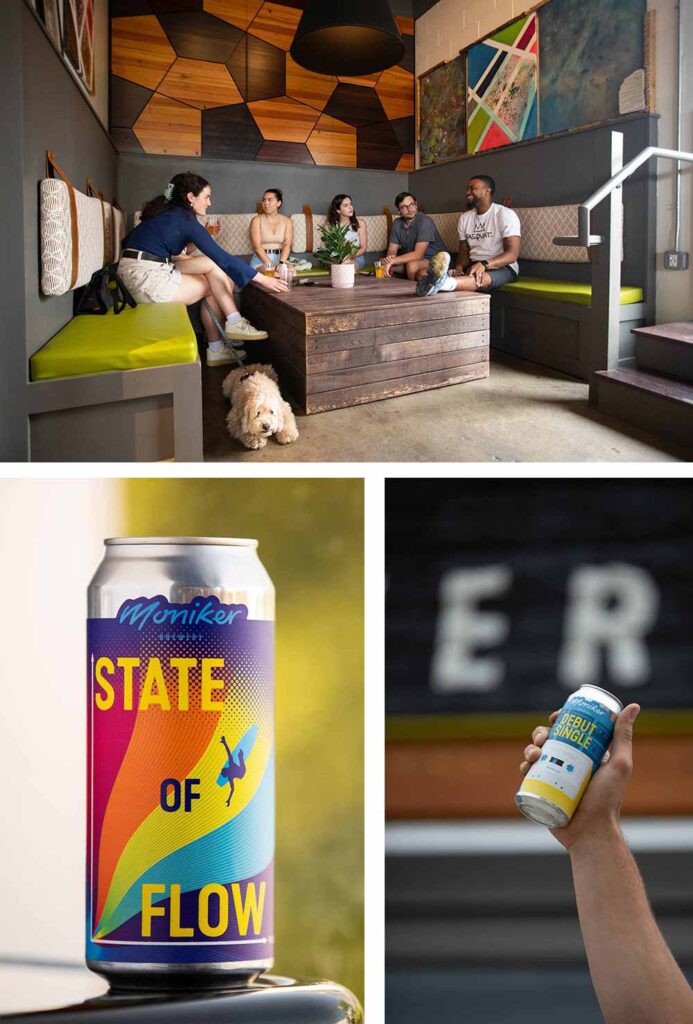
Photography courtesy of Emily Frye | Moniker Brewery
Beer at Moniker is like a 1990s family photo album: full of memories, each picture a little snapshot and story from the past.
That’s not to say Moniker just makes old-school styles of beer. Not at all, but the beers they make each have a purpose, a little bit of heritage or history from the ones who make them.
“We’re not chasing lightning in a can,” explains Benedict. “We’re making beer that we love.”
For instance, Debut Single, Moniker’s first-ever beer.
The cream ale is a nod to Benedict’s family and Estes, who both have roots in Upstate New York.
“Genny Cream was something that was always in my fridge,” laughs Benedict, who loves the style because it’s one of the very few all-American styles of beer (like Kentucky Common or Steam Beer).
To give it their own twist, Moniker adds honey and biscuit malt for a bit more flavor and body, along with American corn—flaked Maize in this case.
“It’s really light and drinkable, but it had a little extra to it,” says Benedict.
Recently, Moniker took their house beer out of rotation, but they plan to bring it back during special times like their anniversary. “It will always have a place in our hearts,” says Benedict.
They even make a bourbon barrel-aged version that “people lose their minds over,” he says.
Overall, Benedict notes that lower-ABV lagers are huge for them right now.
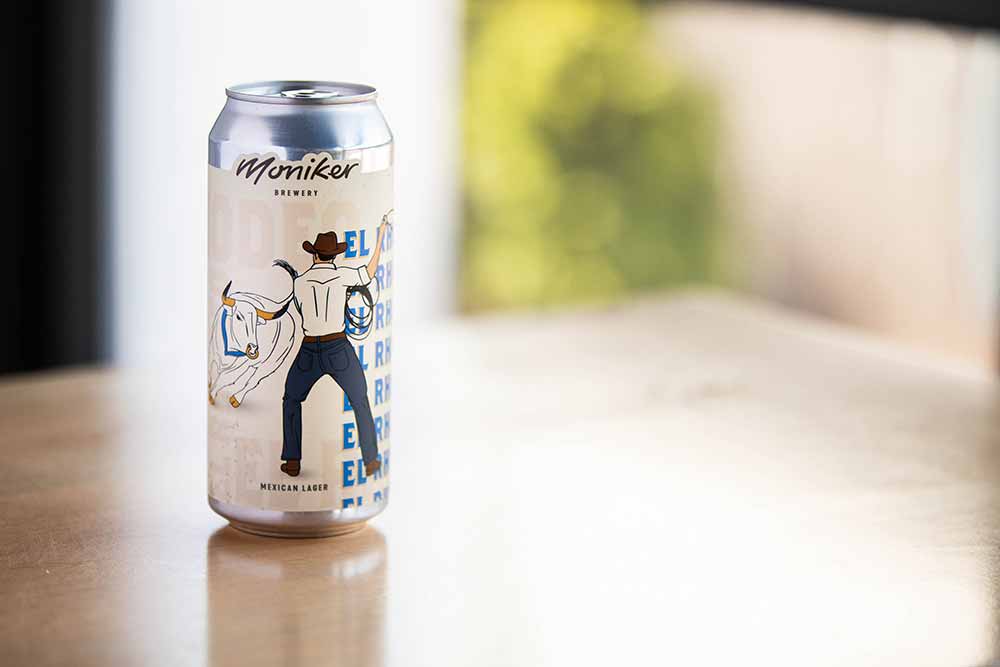
Photography courtesy of Emily Frye | Moniker Brewery
El Rhodeo, a Mexican-style lager, is the number one seller.
Benedict and Estes brewed this beer because “my favorite beer when it’s a hot sunny day is a Modelo,” says Benedict, whose eighteen-year-old self first tried a Mexican lager with his dad on a Caribbean cruise ship in international waters. “Which is why I could drink!” shares Estes, who bought a bucket full of Dos Equis, Corona, and that Modelo.
Moniker wanted to make its own version with better ingredients, such as Pilsner malt, flaked whole corn (instead of corn syrup), and time.
“It immediately took off and has not stopped,” says Benedict, mentioning their lager program often finds inspiration from drinking memories.
“Every single beer means something to either me or the brewers,” he says.
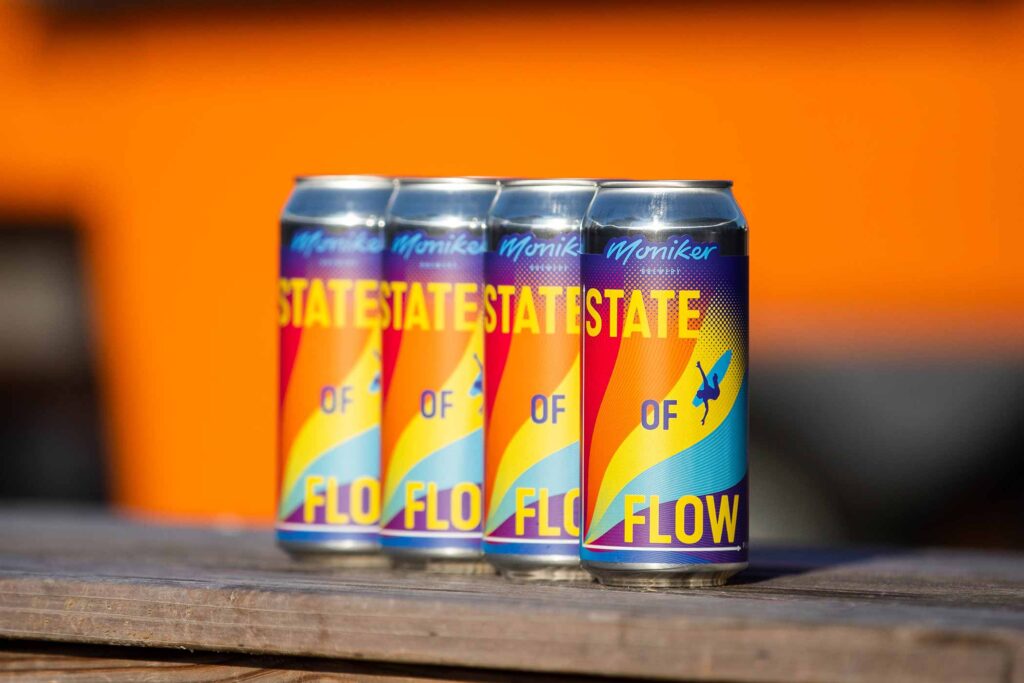
Photography courtesy of Emily Frye | Moniker Brewery
For instance, State of Flow, a German pilsner that “is unanimously all of our favorites simply because we put the most work into it,” shares Benedict, who fell in love with German beer culture after trying his first liter mug of Radeberger at Frankford Hall in Philly.
“Open air, friends, tubed meats, and pickles paired with a beer with over 150 years of culture,” says Benedict. “I was in heaven.”
Currently on their fifteenth or sixteenth batch (Benedict isn’t exactly sure), Moniker’s German pilsner has gone through quite a bit of tweaking.
“That beer went through more changes than my kids did diapers,” laughs Benedict.
While Benedict says it’s hard to describe every change, the two biggest came recently when they swapped out Weyermann malts for those from a local craft maltster called Proximity and brought in incredibly fresh German Saaz hops.
“It changed that beer completely,” gushes Benedict, who attributes many of these small yet significant changes to Moniker’s head brewer, Estes. “We would not be where we are without his brain!”
Behind the Brains of the Thiol Prince of Providence
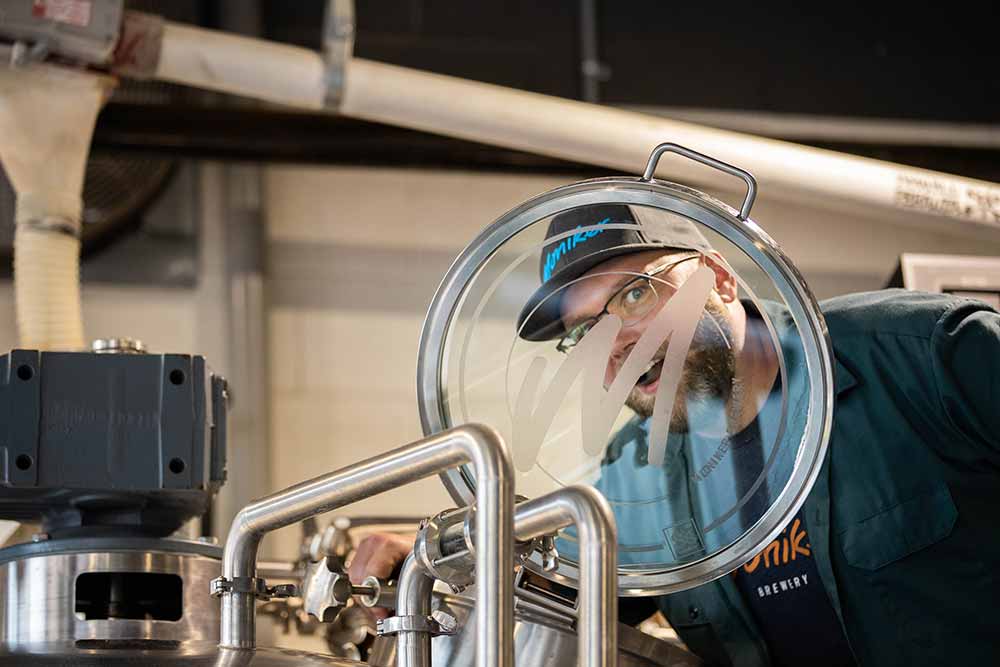
Photography courtesy of Emily Frye | Moniker Brewery
A scientist who formerly worked in water treatment facilities, Estes doesn’t just lead the lager program at Moniker; he also holds the throne of thiol, essentially organic sulfur compounds found in various agricultural products, including fruit, hops, and even grain, that naturally create fragrant elements.
“In some ways, I think brewing chose me more than I chose brewing,” Estes wrote to Hop Culture in an email.
The biochemistry masters student started homebrewing while in grad school, where he gave an hour-long seminar about the chemistry of beer.
His first-ever brew day at a commercial brewery happened during a heat wave where it was easily 110℉ in the brewery. “It was grueling,” he remembers, “but I fell in love with it.”
At Moniker, Estes says he likes to balance the science and art of brewing. Even if he finds the beer is “damn close to perfect,” he’ll still tweak it.
Often describing beer as needing “three dimensions,” Estes pays special attention to water chemistry, layering hops, and fermentation techniques in all of Moniker’s beers.
Notably, the former. “Plenty of breweries make wonderful beer without putting much thought into water chemistry,” says Estes, “but for me, it’s a way to make our beers stand out.”
“He’s able to make fifteen, twenty, thirty small changes to a beer that just brings out a little bit extra of this, a little bit of extra of that,” says Benedict.
And while Estes loves Moniker’s lager program (he thinks the German pilsner, State of Flow, best embodies the brewery), he’s most proud of an American IPA called Blinded by Nostalgia.
“This beer made me fall in love with IPAs again,” he concedes.
The clear IPA with a firm bitterness that doesn’t quite hit West Coast IPA levels is a blend of old-school and new-school hop profiles, with Columbus and Chinook in the whirlpool and a mid-fermentation dry hop. Estes finishes the IPA with a late dry-hopping of El Dorado and Idaho 7 at one pound per barrel each.
The nickname (which, sidenote, personally makes Estes cringe) came from an article about Moniker’s highly recognized thiol program, which they roll out twice a year.
Estes says mastering thiols is a tricky business.
“The beers need the right character to bridge the thiols and the beer together,” he explains, noting he uses specific hops, beer souring, and sometimes fruit concentrates to achieve this. “Thiol beers need to be designed with a lot of intent to make them a truly enjoyable experience.”
Monica or Moniker? Doesn’t Matter How You Say It
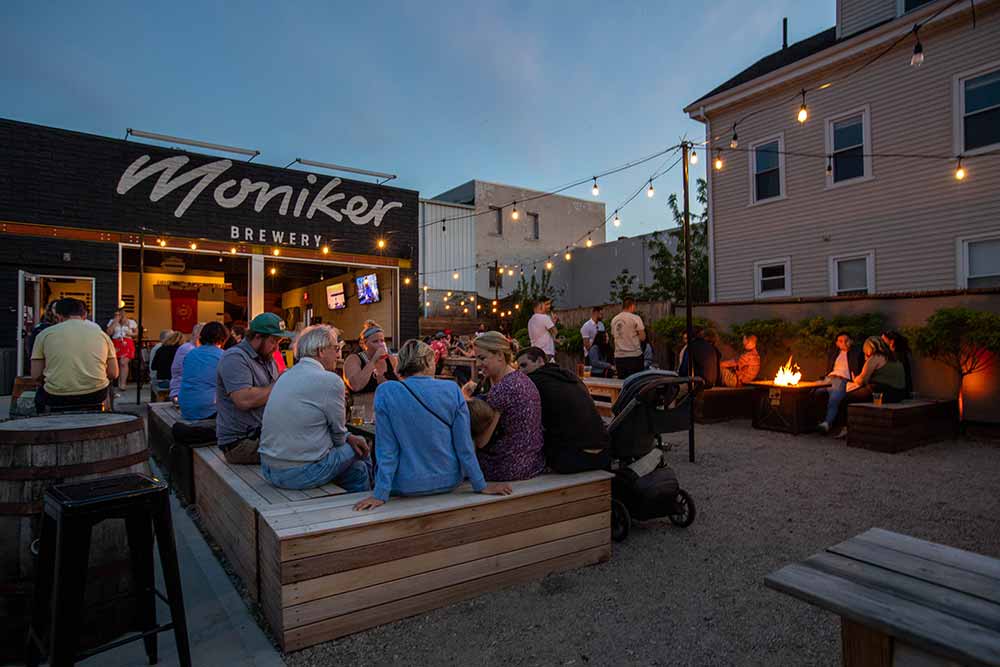
Photography courtesy of Emily Frye | Moniker Brewery
To say, at Moniker, it’s all in the name is a bit cheeky.
But in true Cheers fashion, Moniker has become where everyone knows your name in Providence.
Even if a Rhode Islander’s Northeastern accents mean the R’s come out soft or removed altogether.
“There are so many people we go, oh, have you heard of Monica?” laughs Benedict, who still thinks Moniker is just “a good word” with the right number of syllables.
He even hopes one day that the brewery’s hand-drawn “M” in a custom font will become iconic.
Like the golden-arched M for McDonald’s or the blue F of Facebook, Moniker’s own M has imprinted itself onto the hearts of Providence residents.
And in return, the people of Providence have paid their dues.
“It is such an honor to brew for my community,” says Estes.
No matter how you pronounce it, Moniker is a name that should ring out beyond Rhode Island’s borders.
And if you’re curious, as I was, yes, Benedict does plan to make a beer called Monica.
He says, “That’ll probably be a cream ale!”

